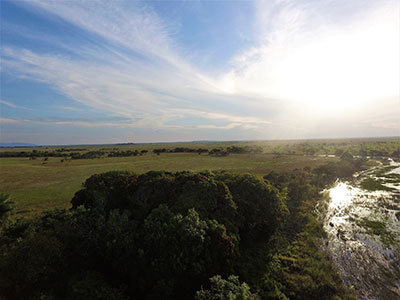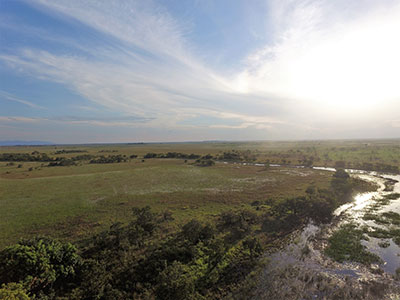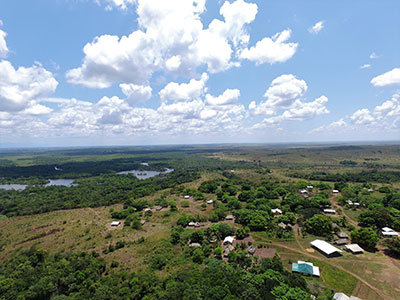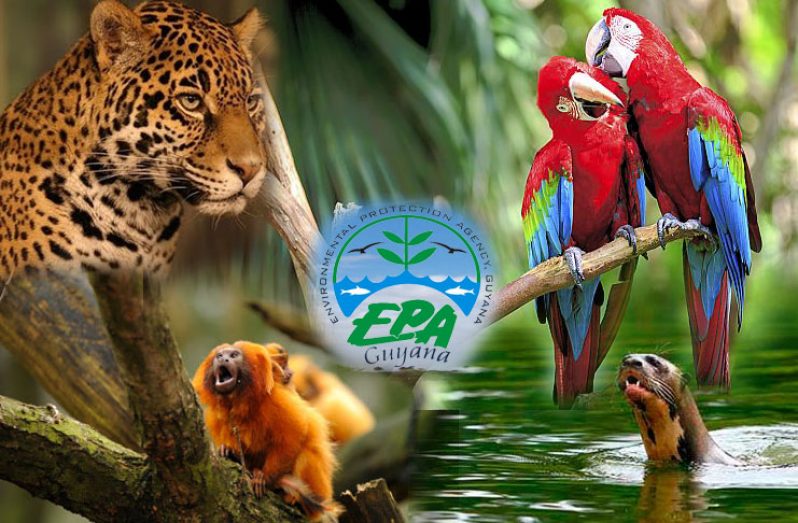GUYANA, known as the ‘Land of Many Waters’, can be aptly described as a ‘water-rich country’. A bird’s eye view would show a vast network of many rivers and creeks which spreads throughout the country. Further, it is not only the aesthetics of our waterways we can boast of but the intricate link to unique ecosystems and the diversity of life they support.
 One such ecosystem is the wetland ecosystem. In last week’s article, we looked at the importance of wetlands to urban areas, however, wetlands ecosystems are also beneficial to Indigenous communities, who have a long-standing connection with these ecosystems.
One such ecosystem is the wetland ecosystem. In last week’s article, we looked at the importance of wetlands to urban areas, however, wetlands ecosystems are also beneficial to Indigenous communities, who have a long-standing connection with these ecosystems.
WETLANDS AND INDIGENOUS PEOPLES OF GUYANA
Indigenous communities are very much dependent on the natural environment to meet their local needs.The rainforest, river, creeks and associated wetlands have been key to the lives of indigenous people throughout the centuries. Our Indigenous peoples have strong cultural and traditional ties to the lands they occupy.
Moreover, it has long been recognised that they have played a vital role in protecting and managing these ecosystems, way before the implementation of conventional conservation measures such as National Protected Areas Systems.
WETLANDS IN GUYANA
Here in Guyana, there are many wetlands, however, the North Rupununi Wetlands are noteworthy.This mega wetland area is associated with the Rupununi, Essequibo and Rewa Rivers along with many lakes and ponds. During the rainy season, what is usually open dry savannahs, soundly becomes a part of a massive floodplain. Associated with these wetlands of the North Rupununi are the Indigenous communities of primarily the Macushi tribe. They depend heavily on these wetlands for clean water, food, materials to make craft, housing material and traditional medicine. What is notable, is that their harvesting techniques are for the most part sustainable and promote protection and conservation of these resources in the long-term.
IMPORTANCE OF TRADITIONAL KNOWLEDGE
The Ramsar Convention on Wetlands encourages the integration of traditional knowledge in the wise use and management of wetlands. To that extent, it has been observed that Indigenous communities, by means of traditional fishing, hunting and harvesting practices, have naturally engaged in the respectful use and protection of these wetlands.
Many of these traditional practices are passed from generation to generation, children being taught by adults in the community through a process of learning by doing. Other traditional knowledge may see the transfer of information through dance or stories. Today, due to changing dynamics within many Indigenous communities, where the youth are otherwise occupied with school and sports, there is the threat of many of these traditional knowledge being lost.
 Other international treaties also emphasise the important role that traditional knowledge of Indigenous peoples can play in the protection and conservation efforts, e.g., under the United Nations Convention for Biological Diversity (UNCBD), to which Guyana is a signatory, there are specific goals and target which call for increased efforts of countries to recognise and incorporate traditional knowledge into national policies to promote sustainable resources management.
Other international treaties also emphasise the important role that traditional knowledge of Indigenous peoples can play in the protection and conservation efforts, e.g., under the United Nations Convention for Biological Diversity (UNCBD), to which Guyana is a signatory, there are specific goals and target which call for increased efforts of countries to recognise and incorporate traditional knowledge into national policies to promote sustainable resources management.
Guyana is working towards those very goals through the implementation of a UK-funded ‘Darwin Initiative project’ entitled “Integrating Traditional Knowledge into National Policies and Practices”. This project will see the collaboration of the Ministry of Indigenous Peoples’ Affairs, Protected Areas Commission (PAC) and Environmental Protection Agency (EPA), in efforts to work with Indigenous communities associated with Protected Areas and relevant policymakers to facilitate dialogue and, as a main output, develop a relevant National Action Plan for Guyana.
You can share your ideas and questions by sending letters to: “Our Earth, Our Environment”, C/O ECEA Programme, Environmental Protection Agency, Ganges Street, Sophia, Georgetown, or email us at eit.epaguyana@gmail.com or follow us on Facebook and Instagram.



.jpg)








